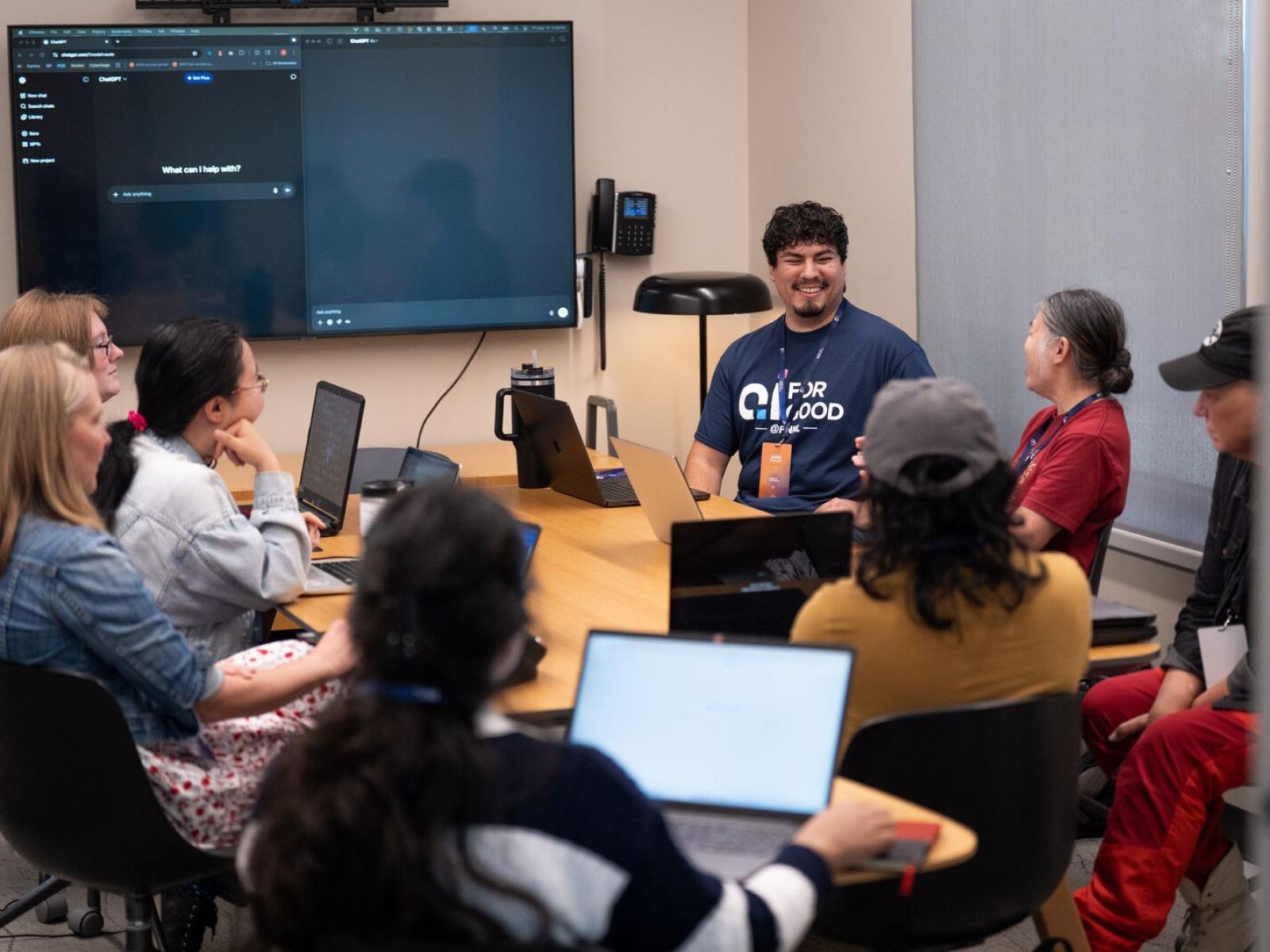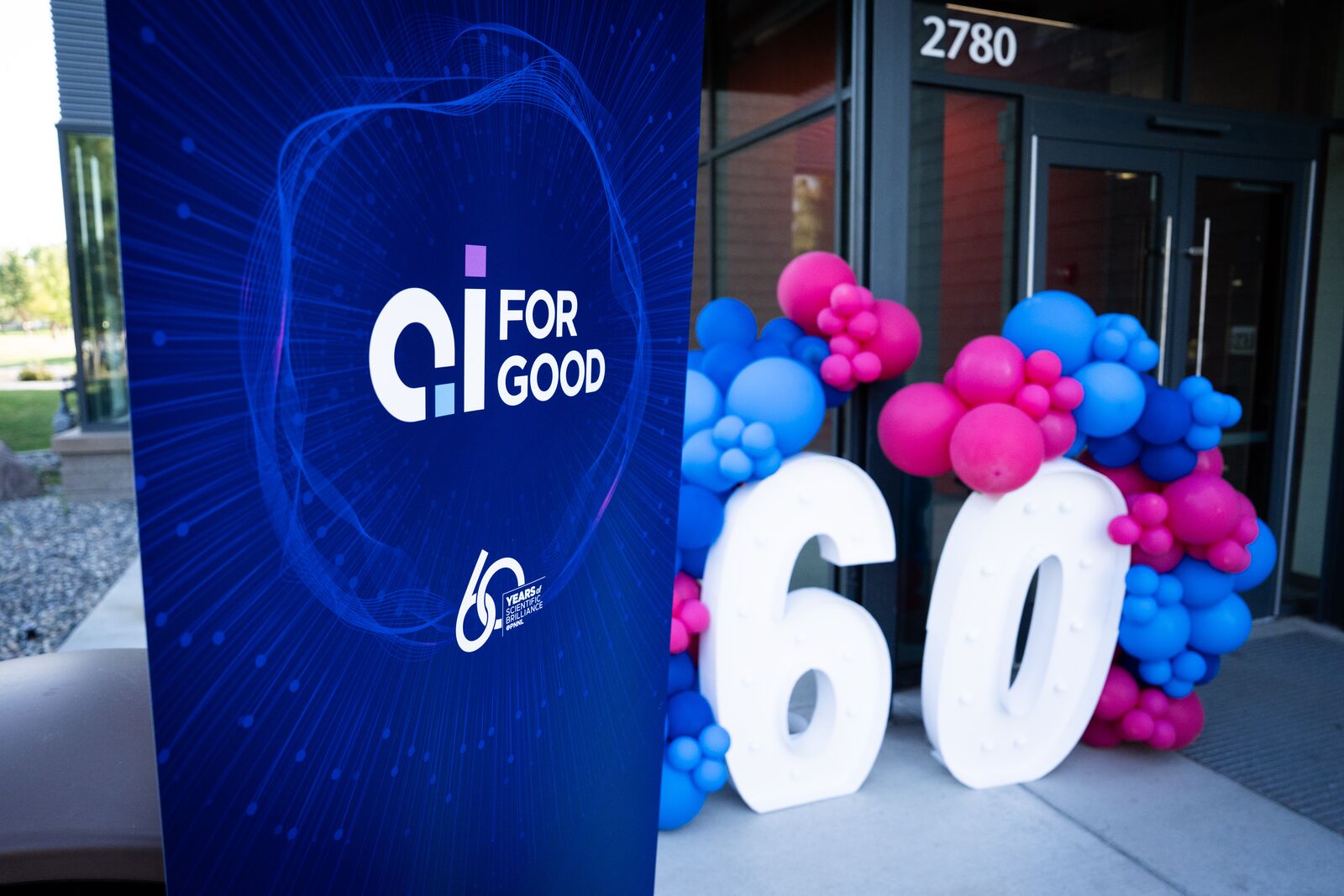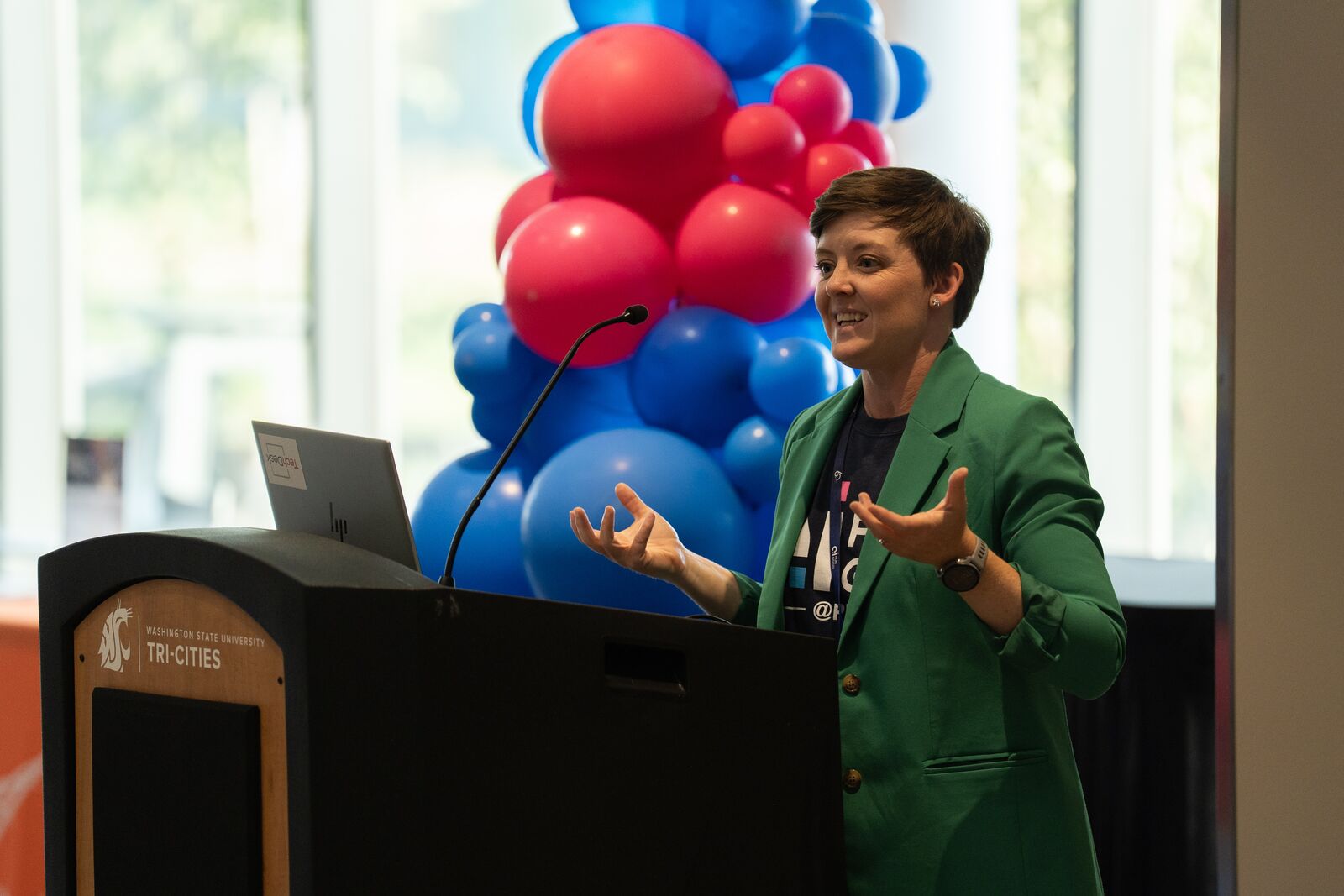Community Event Empowers People with AI Tools
Pacific Northwest National Laboratory celebrates 60 years of community service with an event to demystify AI and inspire new connections between the Lab and its neighbors

Software engineer Juan Barajas leads a breakout session at the AI for Good: Connecting Science, AI, and Community event celebrating Pacific Northwest National Laboratory's 60 years of impact and showing how AI tools can help community members achieve their personal and professional goals.
(Photo by Graham Bourque | Pacific Northwest National Laboratory)
By now, anyone with a smart phone has encountered generative AI (GenAI). The fast-moving technology has been rapidly adopted by companies, schools, and health care providers, among others.
But many people who could benefit from mastering AI skills don’t know where to start.
That’s where Pacific Northwest National Laboratory (PNNL) has stepped in to fill a knowledge gap in the Tri-Cities, Washington, as part of its 60th anniversary celebration in 2025.
On September 19, PNNL hosted a free community event to introduce 100 curious community members to how the Lab is using AI tools and how they can effectively harness these tools in their own lives. Community members were introduced to practical methods to help improve their AI skills, with each participant taking home a personal AI prompt library.
“At PNNL, we believe in the transformative power of AI,” said Court Corley, PNNL director of the Center for AI @PNNL. “In recognition of PNNL’s 60th anniversary, we hosted ‘AI for Good’ to underscore our commitment to connecting advanced technology with community-driven solutions.”

This three-hour event introduced participants to foundational concepts around GenAI, included hands-on practice with personalized support from AI experts, and showcased an innovation expo where participants could see how PNNL is leveraging the power of AI to advance its scientific mission.
“We have a culture of innovation,” said Quentin Kreilmann, the deputy director of the Center for AI. “Now we want to share some of that excitement with our community and see where it takes them.”
Thoa Pham, a water quality technician at South Columbia Basin Water District in Pasco, Washington, and her colleague Cristian De Paz attended the AI for Good workshop.
“This was our first attempt to learn how AI works and how it might help us better serve the district,” said Pham. “At the workshop, we learned to prompt GenAI to help with water quality modeling and developing a water quality index for the data we collect.”
In a little over an hour using the AI tools, Pham created a learning module for water quality modeling, while De Paz’s prompting provided research findings on how to develop a water quality index.
“We were very excited to see that some of its recommendations confirmed our initial research,” Pham said.
PNNL helps drive the GenAI revolution
While the AI for Good event, held at Washington State University Tri-Cities, was an opportunity for the community to learn about AI from PNNL experts, it was far from the first AI event hosted by the Lab.
PNNL had previously hosted multiple large language model (LLM) day-long events, giving scientists an opportunity to test drive the latest LLMs and providing the opportunity to put new developments through their paces. The sessions build on decades of PNNL expertise in developing AI, data science, graph analytics, and many other technologies that complement the latest AI models. By engaging PNNL scientists, AI developers like Google, Microsoft, Anthropic, and OpenAI learn about their models’ strengths and weaknesses. Researchers pose complex problems in energy, chemistry, and materials science and evaluate how the models perform. And PNNL scientists likewise learn to effectively use these AI-driven systems to advance the frontiers of science.

“We present science use cases to the industry partners, we provide feedback, and we look for recommendations on how to leverage their models,” said Kreilmann. He noted that many of the tools in the incubator are prototypes, giving staff and scientists at PNNL early access to the models before they are released more broadly within our enterprise systems.
Up-close exposure to the latest AI technology is just part of a broader effort launched by the Center for AI. The intent of the program, called the AI Incubator, is to open the rapidly evolving field of AI to all employees at PNNL in a safe and accessible manner, keeping PNNL at the forefront of the use of the technology.
The AI Incubator program includes regular hands-on presentations targeted at employees, periodic LLM events, and access to a sandbox of AI tools that are firewalled behind the PNNL cybersecurity network so that sensitive information remains private while researchers learn how to use the tools safely. The incubator was created by senior AI/cloud solutions engineer Jason Jensen and Kreilmann, who leads the endeavor; AI literacy efforts are led by chemist Nancy Washton and human factors scientist Jessica Baweja.
All of these leaders participated in the AI for Good event to mentor interested community members and forge new connections within the community.
AI for science innovation
Currently, scientists at the Lab are integrating GenAI into workflows and research in more than 100 research projects. Some of those were on display at the AI for Good event.
Materials scientist Tiffany Kaspar demonstrated an interactive “game” that shows how AI is helping researchers respond to and correct defects in the deposition of thin film layers on surfaces. The research is important for the development of new functional materials for energy storage and other applications.
“It’s all about speeding up scientific discovery,” said Kreilmann.
More than half of the Laboratory’s 6,500 employees have explored the tools in the AI Incubator, and repeat user activity increases daily, according to Cahley Jaekel, operations lead for the Center for AI. She collaborates with Kreilmann on the AI Incubator and leads AI literacy workshops for staff at PNNL. In any given month, more than 2,000 employees at PNNL tune into the incubator.
“There are definitely people who are championing these tools because they personally have benefited from using them,” Jaekel said.
Published: September 30, 2025